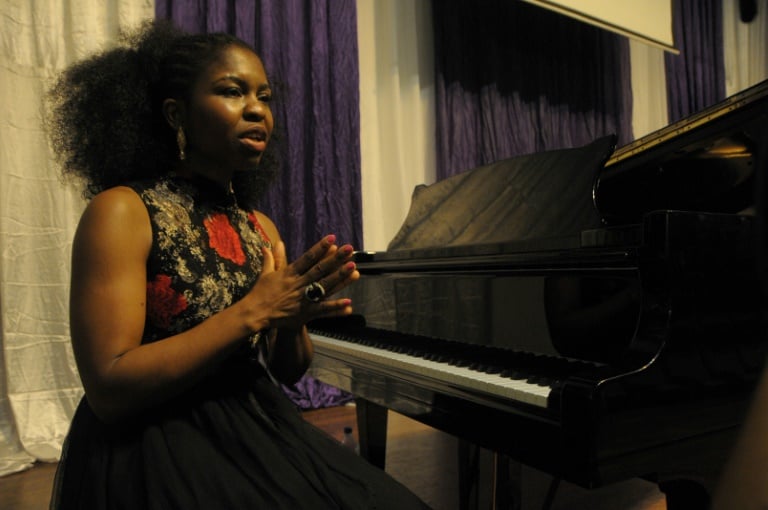Reeza slams Proteas to T20I series win over Pakistan
But it’s not the most surprising thing for the performer, Omo Bello. News of her appearance at the MUSON School of Music has attracted a crowd, even when it’s only for a short rehearsal.
“I didn’t realise to what extent I was recognised in Nigeria,” the 33-year-old admitted after singing “O mio babbino caro”, from Giacomo Puccini’s 1918 opera “Gianni Schicchi”.
“I’ve been away for over a decade and I guess things have changed and I didn’t realise how much. When I was told that lots of people were coming, I was a little surprised.
“It’s a pleasant surprise though, but still a surprise,” she told AFP.
– Wider audiences –
Bello’s story is becoming well-known in her native Nigeria and her adopted country, France.
She’s the Lagos science student whose talent was spotted to win her a scholarship to study at the Paris Conservatoire, whose alumni include Georges Bizet, Claude Debussy and Jean Michel Jarre.
Tours have followed, with an album and awards, including one from the foundation of the late legendary tenor Luciano Pavarotti, and a repertoire that now ranges from Bellini to Verdi.
Back in Nigeria for Christmas before a return to Europe and concerts in Britain, Bello, like many long-term expatriates, reflects on changes back home.

Confident of new audiences via the internet, Omo Bello hopes to see foreign classical sounds touch African hearts, just as African music has been taken up in the West
In a country associated more with Afrobeat and Highlife than Albinoni or Haydn, she said the internet has created new audiences for different musical styles from abroad.
“I know that lots of people discovered me on YouTube in Nigeria and social media, so it’s a good thing, as people see and hear this music (opera) and are surprised that it’s very beautiful,” she said.
“The fact that it’s open to everyone creates a wider audience, so I’m very happy to discover that the public is growing for this music in Nigeria.”
– ‘Music is music’ –
Nigerian success internationally, whether in sports, science or the arts, has often involved young talent being nurtured overseas because of more limited opportunities back home.
South Africa, in contrast, has produced a number of opera singers and has its own professional opera companies.
But Marion Akpata, the director of the School of Music run by the Musical Society of Nigeria (MUSON), said there is potential for more performers like Bello because of the country’s rich tradition of music, particularly in churches.
“Music is an integral part of the Nigerian culture,” said Akpata, a New Yorker who studied at the Crane School of Music and first moved to Nigeria in the 1960s.
“Everything is done with music. A baby is born, music. People die, music. And of course, all the activities in between birth and death (are) accompanied by music…
“Music is music. When Bach was composing, somebody was doing music here in Nigeria. And maybe he didn’t write it down but people were performing.”
The MUSON School of Music, founded in 1989, is Nigeria’s leading — if not only — institution for teaching Western classical music.
Sixty students are currently on a two-year diploma course that covers performance and theory. Opera is part of the syllabus.
Akpata sees no reason why opera cannot thrive in Nigeria because of its universal themes, regardless of differences in language.
“Just think of the world’s most popular opera, (Bizet’s) ‘Carmen’. The story of Carmen can be transposed into every country and every kind of culture,” she said.
“It’s just a matter of doing it.”
– Musical development –
The school’s opera teacher, Joseph Oparamanuike, said students have now performed three operas, including Mozart’s “The Magic Flute”, in initiatives that have spurred greater interest from audiences.
“People are asking for more and more. There are many people who are really wanting this high level of performance,” said Oparamanuike, an alumnus of the Royal Conservatoire of Scotland.
Bello said she wants to share “how wonderful music is… like flowers that I picked in the garden”, bringing to the stage her unique background and experiences as a young African woman.
But as an increasingly established performer, she also recognises the need to help develop the genre and would like to see Nigeria with its own conservatoire and opera house.
Using recent graduates of Europe’s top music academies to help develop performers in places like Nigeria could help identify and nurture the next generation of talent, she suggested.
“African music has gone to the West and why should the opposite be impossible?” she said.
Download our app and read this and other great stories on the move. Available for Android and iOS.